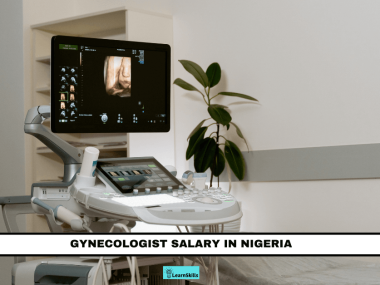The salary differences between doctors and nurses significantly shape the healthcare system in Nigeria. On average, doctors earn between ₦120,000 and ₦270,000 monthly.
Meanwhile, entry-level nurses start around ₦50,000 to ₦80,000 monthly. This gap often influences career choices in the medical field.
Understanding these salaries can shed light on the development of the healthcare industry in Nigeria. The financial disparities between these two roles also highlight issues related to gender equality, as nursing often has a higher percentage of female professionals.
As the demand for skilled healthcare workers grows, so does the need for fair compensation that supports economic growth and acknowledges the essential contributions of both doctors and nurses.
Healthcare Education and Training in Nigeria
In Nigeria, healthcare education and training for doctors and nurses are structured to equip them with essential skills and knowledge. A distinct focus on medical and nursing programs prepares graduates for the challenges in the healthcare sector.
Medical Student Curriculum and Residency Training
Medical education in Nigeria typically starts with a five to six-year program at a recognized university. The curriculum includes basic sciences, clinical skills, and hands-on experience in various medical fields.
During your studies, you will learn subjects like:
- Anatomy
- Physiology
- Pharmacology
- Pathology
After graduation, you must complete a one-year internship before starting residency training. This further specialization can last three to six years, depending on the chosen field, such as surgery, pediatrics, or internal medicine.
Nursing Programs and Specializations
Nursing education in Nigeria consists of diploma programs and degree courses that last between three and five years. The curriculum covers fundamental nursing skills, community health, and patient care.
Courses include:
- Nursing Fundamentals
- Maternity Care
- Pediatrics
- Mental Health Nursing
You can also pursue specializations in intensive care, midwifery, and public health. Many programs offer hands-on training in healthcare settings, allowing you to apply theoretical knowledge directly.
Investment in Professional Development
Investment in professional development is crucial for healthcare workers in Nigeria. Continuing education programs, workshops, and conferences help you stay updated with the latest advancements.
Many hospitals and healthcare organizations encourage their staff to participate in training sessions. This investment aims to improve skills and knowledge, directly impacting patient care quality.
Research opportunities also exist, allowing you to engage in studies that can advance healthcare practices and policies.
In this competitive job market, upgrading your skills enhances your employability and career prospects.
Roles and Responsibilities
Both doctors and nurses have distinct roles and responsibilities in the healthcare system. Understanding these roles is crucial for appreciating how they work together to provide patient care.
Doctor’s Clinical and Administrative Duties
As a doctor, you perform critical tasks in diagnosing and treating patients. Your clinical duties involve taking patient histories, conducting examinations, and ordering tests.
You also analyze test results to make informed decisions about treatment plans. Doctors often specialize in pediatrics, surgery, or internal medicine, requiring advanced training and expertise.
In addition to direct patient care, you handle various administrative tasks, including managing patient records and coordinating with other healthcare workers. Your role often requires good leadership skills to oversee the healthcare team efficiently.
Nurses’ Scope of Practice and Patient Care
As a nurse, your responsibilities primarily revolve around patient care. You provide day-to-day support, focusing on monitoring patients’ conditions. This involves taking vital signs, administering medications, and helping patients with daily activities.
You also serve as a crucial link between doctors and patients. Communication is key, you must relay important information about patients’ progress to the medical team.
Nurses often have specialized roles, such as nurse practitioners or clinical nurse specialists. These roles require additional training and allow you to perform more advanced duties, including specific diagnostic tasks.
Salaries and Benefits Comparison
In Nigeria’s healthcare system, salaries and benefits differ significantly between doctors and nurses. Understanding these differences can inform career decisions and expectations in the industry.
Doctor Salaries Across Specializations
Doctors in Nigeria earn varying salaries based on their specialization. A general practitioner earns between ₦150,000 and ₦250,000 monthly. In contrast, specialists like surgeons or anesthesiologists often make between ₦300,000 and ₦500,000.
Here’s a breakdown:
| Specialization | Salary Range (₦) |
|---|---|
| General Practitioner | 150,000 – 250,000 |
| Specialist (e.g., Surgeon) | 300,000 – 500,000 |
| Senior Consultant | Up to 800,000 |
These figures may vary depending on location, hospital type, and years of experience. Additionally, doctors often receive benefits like health insurance and performance bonuses.
Nurses’ Compensation and Overtime Pay
Nurses in Nigeria generally earn a base salary starting around ₦100,000 monthly. Overtime pay can increase this amount significantly. Here’s a quick overview:
| Position | Base Salary (₦) |
|---|---|
| Newly Registered Nurse | 100,000 |
| Senior Nurse | 150,000 – 250,000 |
| Specialized Nurse | 200,000 – 300,000 |
Nurses often work long hours, which can lead to overtime compensation. While nurses are critical to patient care, their salaries can be lower than those of doctors. Yet, they may receive benefits such as allowances for night shifts, transportation, and health insurance.
Work Environment and Employment Opportunities
The work environment for doctors and nurses in Nigeria varies significantly depending on location and employment sector. Understanding these differences is crucial for making informed career choices.
Urban vs Rural Healthcare Settings
In urban areas, healthcare facilities are often better equipped and offer more advanced technology. You can find well-established hospitals that provide a range of services. Hospitals may offer more job opportunities, but can be highly competitive in cities.
In contrast, rural healthcare settings may lack resources. Nurses and doctors in these areas often have a broader scope of practice due to limited staff. However, the demand for healthcare professionals is high, making job security more favorable.
Consider that salaries may differ as well. Urban salaries tend to be higher due to the cost of living, while rural wages may be lower but come with other benefits like housing.
Public vs Private Sector Employment
Working in the public sector often means more job stability. Government hospitals provide consistent salaries and benefits, which can be appealing. However, public sector jobs have bureaucratic challenges and slower career progression.
On the other hand, private sector employment can offer higher salaries and better working conditions. Many private hospitals have modern facilities and invest more in staff development.
However, these jobs can sometimes be unstable. Private facilities may face financial challenges, affecting job security. Weighing the pros and cons of each sector is essential for your career path.
Policy and Governance Impact on Healthcare Salaries
Policies and governance play a significant role in shaping healthcare salaries in Nigeria. Understanding how government spending and gender equity affect compensation can help you better grasp the challenges faced by healthcare professionals.
Government Healthcare Spending and Salaries
The Nigerian government allocates a significant portion of its budget to healthcare. However, inadequate funding often leads to salary delays and disparities. Many healthcare workers report receiving their salaries months late. This situation forces some to find additional income sources.
According to recent studies, healthcare spending impacts salary structures. For instance, public sector doctors earn more than nurses. Yet, both face issues related to salary stability.
Improved healthcare recommendations focus on ensuring timely payments and adequate resources for health facilities.
Using performance-based incentives can enhance motivation. Better funding can lead to sustainable salary increases for healthcare workers. Addressing these issues can improve workforce morale in Nigeria.
Gender Equality and Equity in Healthcare Compensation
Gender equality is a crucial factor in healthcare salaries. Despite having similar roles and responsibilities, female healthcare workers earn less than their male counterparts. This gap needs attention to ensure fairness.
Policy recommendations suggest implementing transparent salary structures. This can promote gender equity within the healthcare system.
Ensuring equal pay for equal work is an important step. Training and mentorship programs for women in health can also help promote equality.
Governance plays a key role in promoting these changes. Advocating for women’s rights in healthcare will help level the playing field for all professionals. Addressing these gender disparities can lead to a more balanced and fair workforce.










